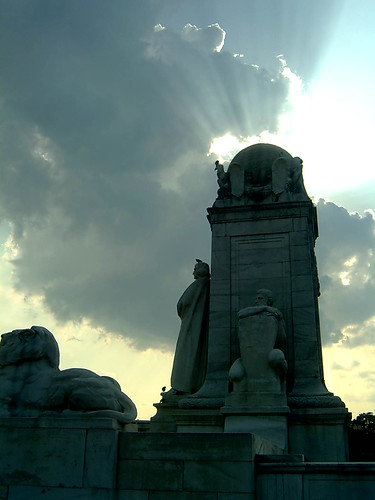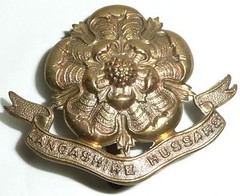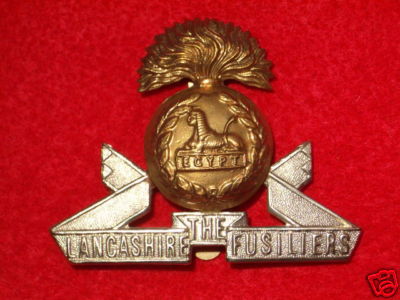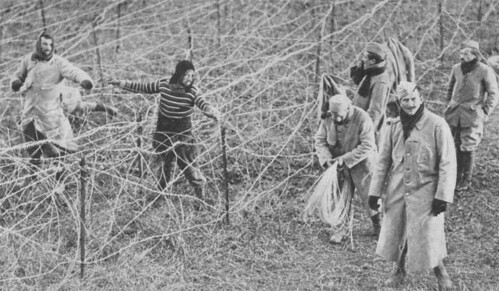
Back in November 2006, I criticized the weak campaign of then-U.S. Maryland senatorial candidate Michael Steele (see link to my blog post through the title above).
Mr. Steele has now risen to the vaunted heights of Chairman of the national Republican Party and he is the first African American to achieve that position. I give him every credit for being chosen by his fellow Republicans to lead the party, undoubtedly a great opportunity for him.
Indeed, Michael Steele has been appointed to this important position at a time when the "Grand Old Party" (G.O.P.) is at its lowest point in recent history. The November election results favoring the Democrats can be partly attributed to the unpopularity of the Republican administration of former President George W. Bush, characterized by sky-high spending and grave mistakes in regard to the war in Iraq and in the aftermath of Hurricane Katrina. Bush's unpopularity and the surprising political skill of the young and charismatic Democratic Party candidate, Barack Obama, led to Mr. Obama's clear victory... and the election of a man who is himself of course an African American.
Of most consequence to the future of the G.O.P., the success of the Democratic presidential bid also led to Republican defeats for seats in both the Senate and the House of Representatives. With the recent defection of moderate Republican Senator Arlen Spector of Pennsylvania to the Democratic Party and the likely seating of comedian and Democrat Al Franken (for better or worse!) as the second Senator for Minnesota, the Democrats will control both houses of Congress at a time when President Obama is proposing major legislation.
The G.O.P. appears divided, hung up on issues such as opposition to abortion, stem cell research, and the environmental movement. Verily, the party is sundered, calling out for new leadership.
Conservative commentator Rush Limbaugh and ex-V.P. Dick Cheney have become the G.O.P's loudest voices. While the demogogic Limbaugh and the driven Cheney have supporters on the far right, I believe, along with more moderate Americans, that they are for the most part not popular with the electorate. They are preaching mostly to the choir. Oh, dear. The G.O.P's lack of unity is particularly disappointing when the nation faces dire economic times. I do believe a two-party or multi-party system, and it would be nice to see the Republicans get their act together and propose workable solutions to the ills that face us instead of just being the party of "No" opposing Obama's agenda.
Back in 2006, Steele, then Maryland lieutenant governor, ran against and was defeated by popular Democrat 35-year veteran Congressman Benjamin L. Cardin to fill retiring Senator Paul S. Sarbanes' seat. As I wrote then, while Mr. Steele dissed Democrats for dirty tricks, the candidate portrayed himself as honest and clean cut, his candidacy characterized most by his statement in a TV ad that he had a "liking for puppies"! I noted that he came across as "a nice guy but a politician with no substance."
Now it seems as if this Man of Steele is unfortunately acting in much the same way in the role of Republican Chairman. Man of Steele? More like feet of clay and, worse, an out-of-control off-topic opinion machine that makes Obama's gaffe-prone VP Joe Biden look like a neophyte.
Kathleen Parker, in an op-ed piece about the Republican Chairman in yesterday's Washington Post wrote that Biden must begin each morning with a prayer, "Please, God, let Michael Steele go on TV today."
Here's more from Ms. Parker's opinion article, "Steele but No Magnet":
"The running joke is that Republicans have 'tragic' where Democrats have 'magic.' The emerging consensus is that Steele, though he means well, has the wrong personality for the job.
"'He's goofy and light in heavy times,' as one insider put it.'"
So, Michael, he's your chance to live up to your name, and provide the inspiration that your ailing party needs. It would be nice to see a Marylander do that. Good luck, Michael!
Dramatic sky at the Columbus Statue, Union Station, Washington, D.C.
Union Station, D.C., 3:48 P.M.
Congressman Bluetooth berates
an intern, hands flapping,
guarding Samsonite luggage
like a mother barracuda.
Homeless man with ebony skin
touches each granite block.
Pencil-thin-moustache guy with
Stars and Striped tie pulls
a screwed-up ball of dollars
from deep within a pocket
of his baggy pants, scrutinizes
each bill, Marlboro on lip.
Christopher T. George
Thursday, May 21, 2009
Man of Steele II
Posted by
Christopher T. George
at
9:44 AM
0
comments
![]()
Labels: _D.C., African_Americans, Christopher_Columbus, Michael_Steele, Republican_Party, Washington
Monday, May 11, 2009
Chris's World War I Presentation at Fort Mifflin
Luckily the weather over the weekend was brilliant compared to the dire English-style rain of the days before. So I had a good drive up and found the correct exit to find Fort Mifflin on the outskirts of Philadelphia National Airport. One of the jokes about the fort, which was begun in the 1770's, is that a visitor asked "Why did they build the fort by the airport?" Akin to one I was told while at Mifflin, that a visitor at Gettysburg asked, "How did they fight around all the monuments?"
So despite getting a bit lost, speeding past the entrance to the fort itself and ending up down a long road past the UPS facility and oil refinery facilities I doubled back and found the right road. If I had read the instructions more closely I would have seen that I had been told to take the immediate left after I went through a tunnel. It didn't help that the Fort sign was not on the road itself but set back a bit by a woodline parallel to the road I was on. Excuses. Excuses.
So I arrived in time for coffee and doughnuts, though I stuck just with a cup of Joe, and I was able to meet the organizer of the seminar, Jeff LaMonica of the East Coast Chapter of the Western Front Association, and to get ready to set up for my talk. There were about thirty interested persons of all ages in attendance.
I had been preparing my presention for several weeks, and was able to get information on my grandfather, George Thompson Matchett's war service through researcher Mark Andrew Pardoe as well as a Liverpool contact, John Robertson. My grandfather had two brothers, William Charles Matchett or Billy Matchett, born 1892, who became a well-known Liverpool comedian (he is in a book called Mersey Stars by Michael Smout, 2000, next to Paul McCartney who ironically was once his paperboy... Uncle Bill would shout at him for climbing over the fence between the houses), and Henry or Harry Matchett, born 1896, who later was a greengrocer with a business supplying the ships with produce. Mr. Robertson was able to tell me, based on information on the general war medals they received, that they were both in the Liverpool Regiment, but that their actual full war records do not survive. In fact, about 60% of British World War I records were destroyed in a German World War II air raid on London. Incredibly, my grandad's records did survive though those of his two brothers did not.
I'll post some excerpts from my talk:
Grandad told me he was educated with his two brothers, elder brother Billy, born 1889, and younger brother Harry, at the Harrington Board School in Toxteth Park, Liverpool. The school and the family house was just up the street from the city’s southern line of docks. As a boy he remembered watching a Highland regiment march down the street toward the docked troopships bound for the Boer War.
Before the First World War, he went to Canada in 1912 with his friend from Liverpool, George Naylor. During the ocean passage on board the liner that brought them to Canada, Naylor and my grandfather met a girl. She wrote down her address in Montreal, and they decided to look her up when they got there. When they finally located her house, it appeared too grand a mansion for the two young men to make an appearance, and they went away without calling on her. The two friends parted ways and my Grandad answered an advertisement for a farmhand to work for a farmer in Yorkton in Saskatchewan on the Canadian prairies. He told me that he was mistreated by the “old German farmer” and yearned to get away. One day, in the distance, he saw a horseman approaching. He was pleasantly surprised to find that it was his friend from home, George Naylor. Between them, they hatched a scheme for my grandfather to run away from the farmer and for them to both seek work as cowboys on a ranch. My grandfather said that he always had a liking of horses and wanted to work “among them”, as he told me. He also informed me that Naylor later was a member of a “horse-stealing gang” across the border into the United States. An old leather wallet that Naylor gave to my grandfather as a gift is one of my mementos of my Grandad. It has an Indian in full headdress on the front.
My Grandad decided to return to England with the idea of later returning to Canada. Remarkably, although he had told no one that he was returning from Canada, his grandmother was waiting for him at the landing stage at the Pier Head in Liverpool when his ship arrived. With events in Europe escalating toward war and the fact that he met and married my grandmother, the former Sarah Elizabeth Potts (born Gateshead, County Durham on August 4, 1897), the opportunity to return to Canada evaporated. A year before war was declared, he volunteered for the Lancashire Hussars Yeomanry Regiment. Given his liking for horses, it made sense for him to join a cavalry unit.
Britain declared war on Germany on August 4, 1914. At the beginning of the conflict, my grandfather found himself in training camp at Rufford Park near Ormskirk and Kirkby Lonsdale, Lancashire. 
The Lancashire Hussars were a Territorial army unit, the counterpart of a U.S. National Guard unit, called up for national service in the emergency. The cap badge for the unit shows the red rose of Lancashire. It can be seen in the handout. I also do have the Lancashire Hussars dogtag for my grandfather, erroneously stamped “T. G. [sic] Matchett 782 Lancs. Hrs. Y.”
My grandfather related to me a number of anecdotes about camp life. He said that because of a shortage of toilet paper, the Sergeant Major barked out to the enlisted men that they would only be allowed [I]three sheets of toilet paper[/I] each, or as the Sergeant Major put it, “One [sheet] up, one down, and one for polishing off!”
He also talked about the way some of his fellow soldiers would pronounce their surnames. One soldier bore the stout Northern English last name of “Sidebottom”—but called himself “Siddy-Butt-Em.” Yet another soldier’s name was “Death”—certainly a most unfortunate name for any serviceman who would be going into harm’s way, not to mention possibly being felt to be unlucky by his fellow soldiers; the man adopted the name instead of “De Ath” to get round that problem.
In 1916, George T. Matchett was transferred to a regular infantry regiment, the Lancashire Fusiliers, again as a private. The Fusiliers are a storied regiment, the descendant of the East Devonshire or 20th Regiment, which is of interest to me as a War of 1812 historian, because it was the regiment for which Major General Robert Ross, killed outside of Baltimore on September 12, 1814, served as commanding colonel until the time of his death.
In September 1992, as part of my research into Ross’s career and role in the 1812–1815 war in the Chesapeake Bay, I visited the regimental museum of the Lancashire Fusiliers in Bury, outside of Manchester. At that time I made an enquiry with the regimental secretary about my grandfather’s service during the Great War. But of course the major reason for my visit was to gather information on General Ross, not on Private George Matchett. 
The emblem of the Lancashire Fusiliers, as seen on the regiment’s cap badge worn by my grandfather, is the Sphinx seated above the word “Egypt” in honor of the regiment’s service against Napoleon in Egypt in 1801—operations in which General Robert Ross was involved as a young officer.
My Grandad was mobilised on August 5, 1914, and transferred from the Hussars to the Lancashire Fusiliers on September 8, 1916. G. T. Matchett was a private in the Fusiliers’ 12th battalion as part of the British–French Expeditionary Force sent to Greece. Specifically, the 12th battalion of the Lancs. Fusiliers were part of the 22nd Division, 65th Brigade, based in Salonika, present-day Thessalonika, capital of the Greek province of Macedonia. The first elements of the Lancashire Fusiliers had arrived in Salonika in November 1915 and the regiment would be based there until July 2, 1918. The British force in Salonika were under the overall command of Lt. Gen. George Francis Milne.
As noted in the web biography of General Milne at FirstWorldWar.com:
"From January 1916 Milne was placed in command of all British forces serving in Salonika; but his scope for command was severely limited by the determination of the Chief of the Imperial General Staff, Sir William Robertson, to prevent offensive operations in Salonika—in his opinion a pointless theatre for operations."
Indeed, the Salonika or Macedonian front was regarded as a less important arena by Field Marshal Sir William Robert Robertson, and presumably by others in the British high command in London as well. Because of the view at the time of its lack of importance, and subsequent agreement by historians that it was not a major front, what occurred there in 1916–1918 is one of the lesser known episodes of the Great War. Originally the British and French forces were sent out to help Serbia in fighting Austria-Hungary and Bulgaria but the Serbs were defeated before the Allies got there. It was decided to keep them there anyway. One area north of Salonika was so laden with barbed wire that it was known as the "Bird's Nest". The following image shows French troops laying some of that wire.
My grandfather told me during his time in Greece, he was involved guarding troop transports travelling north into Macedonia during battles against the Bulgarians and Germans. In a somewhat self-deprecatory and low-key statement he told me that in ferrying these supplies to the front, “Some horses were killed, a few men as well.”
In total, the records show that my grandfather served in Salonika from September 19, 1916 to January 25, 1919. He transferred to the Western Command Labour Company (WCLC) Labour Corps on March 12, 1918. A year later, the war having been brought to a close by the defeat of Germany and the Central Powers, he was judged to be “surplus to Military requirements” and discharged on March 12, 1919. His character was deemed to be “Very Good” and he subsequently received a pension.
As did so many other Allied troops serving on the Macedonian front, Private George T. Matchett contracted malaria, symptoms of which would recur later in life, as is characteristic of this mosquito-borne disease. Malaria proved to be a serious drain on manpower on the Allied effort during the Salonika campaign. British forces suffered 162,517 cases of the disease and in total 505,024 non-battle casualties. Because the campaign had been given low priority by the War Office, the assistance rendered by voluntary medical organisations, such as the Scottish Women’s Hospitals, proved invaluable.
My grandfather’s medical records show that not only did he have recurrent malaria, but also internal complications in his left knee. The knee trouble started in 1915 and is attributed to a kick from a horse while he was still serving with the Lancs Hussars. Remember I said that he said he wanted to work “among horses”?
After my talk I along with the other speaker for the day were able to enjoy a nice sandwich lunch at a local eatery paid for my Mr LaMonica and we returned for a tour of Fort Mifflin in brilliant sunshine. The tour of the fort was interesting. In November 1777, it withstood a 6-week seige by British Royal Navy forces under Admiral William Howe which were trying to force their way up to Philadelphia, where the British Army had already chased out General George Washington's troops which then went into camp in Valley Forge.
The tour guide did a good job at emphasizing the pivotal role of Fort Mifflin in ensuring Washington's survival and the ultimate American victory. He did though I thought miss an important part of the American story in that he didn't mention Pennsylvania-born Colonel Samuel Smith, the acting commander of Fort Mifflin during the seige of 1777, later on commander-in-chief at Baltimore in 1814, that withstood the British bombardment and attempted British Army invasion that led to the writing of The Star-Spangled Banner. I am going to write to the fort to get them to focus on that part of the story.
In all a most satisfying day. I slid out from the group touring the fort as a black powder demonstration began since I have seen such demonstrations so many times before. I climbed up on the battlements for a nice view over the river and relax while smoking a cigar. I able to see swallows landing on birds nests round the moat and a large turtle basking on a log in the sunlight. Had a good drive back to Baltimore, as good as the journey up.
Posted by
Christopher T. George
at
7:23 AM
0
comments
![]()
Labels: British_Army, Canada, World_War_I
Saturday, May 02, 2009
Great War Presentation by Chris George at Fort Mifflin, Philadelphia, Saturday, May 9

This coming weekend I will be making a presentation on my grandfather's World War I military service in the British Army. It is going to be at a meeting of the East Coast Chapter of the Western Front Association at historic Fort Mifflin near Philadelphia Airport. For information on Fort Mifflin, hit the title above. The presentation is entitled "A British 'Grunt' in the Great War: The Service of Private George T. Matchett." Complete details on the day's program below.
My maternal grandfather, George T. Matchett, was born April 15, 1892, to a father of the same name, George Thompson Matchett, a dock labourer, and mother Margaret K. Rowlands Matchett of 177 Beaufort Street, Toxteth Park, Liverpool, Lancashire, England. My Grandad told the story that he was so weak and puny when he was born that the doctor hesitated to make out a birth certificate immediately. Therefore, his birth was not recorded for a whole month; his birth certificate reads that he was born May 15, 1892. My grandfather would live to age 94, eventually dying January 18, 1987.
In 1914, he volunteered for the Lancashire Hussars Yeomanry Regiment: given his liking of horses, it made sense for him to join a cavalry unit. At the beginning of the war in 1914, my grandfather was in the Lancashire Hussars Yeomanry regiment and he spent time in camp in the first year of the war at Rufford Park near Ormskirk and Kirkby Lonsdale, Lancashire. I have a dogtag marked somewhat erroneously "T. G. Matchett 782 Lancs. Hrs. Y."
A year into the war, my grandfather was issued with a bicycle instead of a horse. The substitution was due to the fact that the slaughter of horses was so immense that all the agricultural horses had been rounded up, enforcing the total mechanization of British farming. Even this was not sufficient, so when no more than a tiny residue of horses remained, which were necessary to draw heavy munitions, bicycles were issued for the cavalrymen’s use.
Horseman, Passed By
Before the war, my English grandfather went
to Canada and became a cowboy on the prairie;
as war loomed, he returned home, enlisted
in the Yeomanry, ready to cry out "Hussar!"
as he waved his sabre, riding over the Huns
in their Pickelhaubes. I see him fresh and
bright-eyed with the cavalryman's leather
halter, neat pockets packed with brass bullets.
But it was, after all, the new, twentieth century,
horsepower on the way out. The high command
reconsidered, horses being shredded just as men,
and they issued the cavalry boys bicycles instead.
Later, Grandad ferried supplies to the Macedonian
front. I never got clear: did he ride a bike then?
Christopher T. George
For the rest of the war, he served in the Lancashire Fusiliers infantry, as a private. His Great War medals show on the rim that he was service no. 209450. G. T. Matchett was in the Lancashire Fusiliers 12th batallion as part of the British Expeditionary Force sent to Greece and based in Salonika (present-day Thessalonika). He told me he was involved in troop transports and supply into Macedonia while fighting the Bulgarians. In a somewhat self-deprecatory and low-key statement he told me that in ferrying these supplies to the front, "Some horses were killed, a few men as well."
He contracted malaria while in Salonika, symptoms of which would recur during his life from thence forward, as is characteristic of this mosquito-borne disease. His elder brother Billy Matchett (1889-1974) was a music hall comedian who entertained the troops, while his younger brother Harry Matchett served with a rifle company during the war.
WFA East Coast Chapter Spring Seminar
at
Fort Mifflin, Philadelphia, PA
9 May 2009
9 AM – Registration, Coffee and Doughnuts
10 AM – Christopher George, A British 'Grunt' in the Great War: The Service of Private George T. Matchett
11 AM – Tim Mulligan, World War I German Naval Records at the National
Archives: Access and Research Possibilities
Noon – Lunch On Your Own
1:30 PM – Tour of Fort Mifflin and Eighteenth Century Weapons Demonstration
3:00 PM – Program Ends
Registration Fee – $25 Per Person
Mail Checks Payable To: WFA East Coast Chapter
3116 S. 17th St.
Philadelphia, PA 19145
Directions from North: South on I-95, take Exit 15 Island Avenue/Enterprise Avenue. At end of exit ramp, you will be on Enterprise Avenue. At stop sign turn left onto Fort Mifflin Road. Follow road, through short tunnel, to the first left turn. See sign on right. After left hand turn, follow signs straight into the Fort. Free Parking is on left.
Directions from South: North on I-95, take Exit 13 - Valley Forge/West 291. Bear right and follow sign for Island Avenue. At traffic light (Hilton Hotel on left corner), turn left onto Island Avenue. At stop sign turn left onto Enterprise Avenue. At stop sign, turn right onto Fort Mifflin Road. Follow road, through short tunnel, to the first left turn. See sign on right. After left hand turn, follow signs straight into the Fort. Free Parking is on left.
Information Contact: JLaMonica@DCCC.edu or (610)355-7147
Posted by
Christopher T. George
at
5:11 AM
0
comments
![]()
Labels: Fort Mifflin, Liverpool family funerals death lawn_bowling magpie, Philadelphia, World_War_I